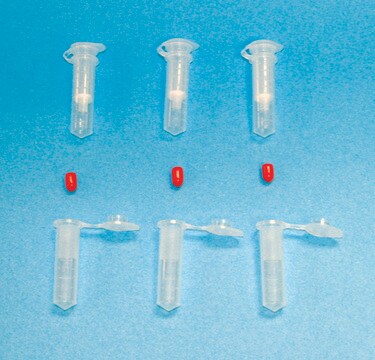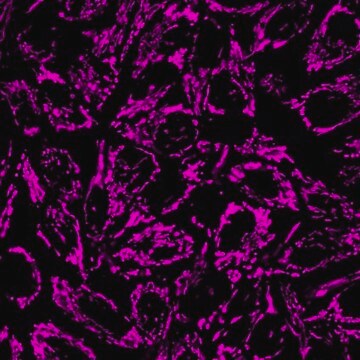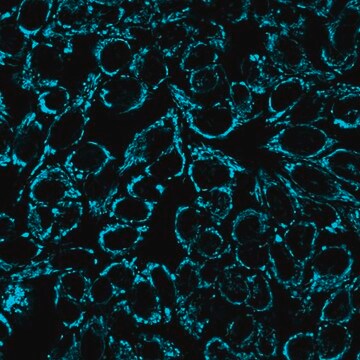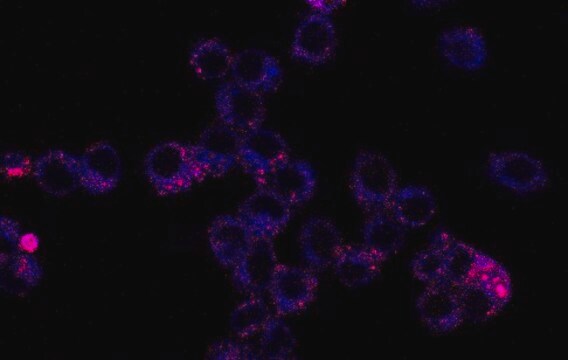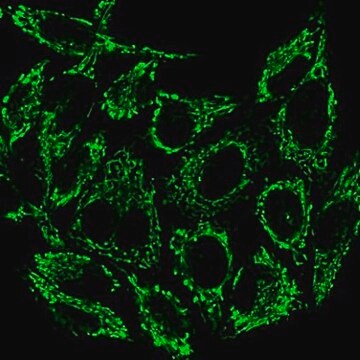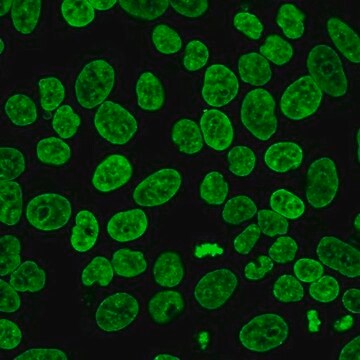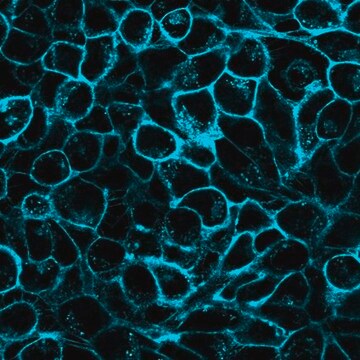About This Item
Kod UNSPSC:
12352207
NACRES:
NA.47
Polecane produkty
pochodzenie biologiczne
Unknown
opakowanie
vial of 1 mg
producent / nazwa handlowa
Millipore
tryb wzrostu
N/A
metody
cell culture | mammalian: suitable
Warunki transportu
dry ice
temp. przechowywania
−20°C
Opis ogólny
BioTracker MitoBlue Live Cell Dye is a synthetic bisbenzamidine derivative that selectively stains functional mitochondria while displaying low toxicity, bright blue emission, and high resistance to photobleaching in both live and fixed cells (1). It is a unique mitochondrial dye in that after initially staining mitochondria, the dye is transported to lysosomes in a time-dependent manner. This distinct staining pattern allows for monitoring and tracking the mitochondrial recycling mechanism in living cells (2). MitoBlue has been shown to be suitable for two-photon microscopy using a 740 nm two-photon excitation (TPE) wavelength and emission channel at 480 nm (2).
Spectral Properties</bold>
Absorbance: 329nm
Emission: 420nm
Reference:
1. Sa?nchez, Mateo I., et al. "MitoBlue: a nontoxic and photostable blue-emitting dye that selectively labels functional mitochondria." ACS chemical biology 9.12 (2014): 2742-2747.
2. Sánchez, Mateo I., et al. "MitoBlue as a tool to analyze the mitochondria-lysosome communication." Scientific reports 10.1 (2020): 1-12.
Spectral Properties</bold>
Absorbance: 329nm
Emission: 420nm
Reference:
1. Sa?nchez, Mateo I., et al. "MitoBlue: a nontoxic and photostable blue-emitting dye that selectively labels functional mitochondria." ACS chemical biology 9.12 (2014): 2742-2747.
2. Sánchez, Mateo I., et al. "MitoBlue as a tool to analyze the mitochondria-lysosome communication." Scientific reports 10.1 (2020): 1-12.
Zastosowanie
Purity >97% confirmed by HPLC. Identification confirmed by HNMR, LC-MS, and elemental analysis.
Cechy i korzyści
Live cell imaging dye that stains functional mitochondria and tracks the mitochondrial degradation process and transport to lysosomes.
Postać fizyczna
Lyophilized. Yellow solid.
Przechowywanie i stabilność
Store at -20°C, desiccate and protect from light.Note: Centrifuge vial briefly to collect contents at bottom of vial before opening
Inne uwagi
This product is intended for sale and sold solely to academic institutions for internal academic research use per the terms of the “Academic Use Agreement” as detailed in the product documentation.
Oświadczenie o zrzeczeniu się odpowiedzialności
Unless otherwise stated in our catalog or other company documentation accompanying the product(s), our products are intended for research use only and are not to be used for any other purpose, which includes but is not limited to, unauthorized commercial uses, in vitro diagnostic uses, ex vivo or in vivo therapeutic uses or any type of consumption or application to humans or animals.
Ta strona może zawierać tekst przetłumaczony maszynowo.
Hasło ostrzegawcze
Warning
Zwroty wskazujące rodzaj zagrożenia
Zwroty wskazujące środki ostrożności
Klasyfikacja zagrożeń
Eye Irrit. 2 - Skin Irrit. 2
Kod klasy składowania
11 - Combustible Solids
Klasa zagrożenia wodnego (WGK)
WGK 3
Temperatura zapłonu (°F)
Not applicable
Temperatura zapłonu (°C)
Not applicable
Certyfikaty analizy (CoA)
Poszukaj Certyfikaty analizy (CoA), wpisując numer partii/serii produktów. Numery serii i partii można znaleźć na etykiecie produktu po słowach „seria” lub „partia”.
Masz już ten produkt?
Dokumenty związane z niedawno zakupionymi produktami zostały zamieszczone w Bibliotece dokumentów.
Nasz zespół naukowców ma doświadczenie we wszystkich obszarach badań, w tym w naukach przyrodniczych, materiałoznawstwie, syntezie chemicznej, chromatografii, analityce i wielu innych dziedzinach.
Skontaktuj się z zespołem ds. pomocy technicznej